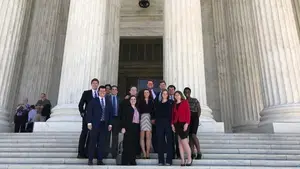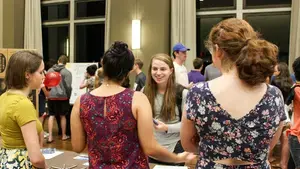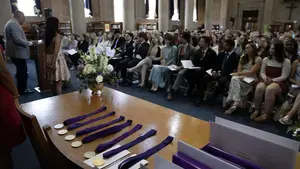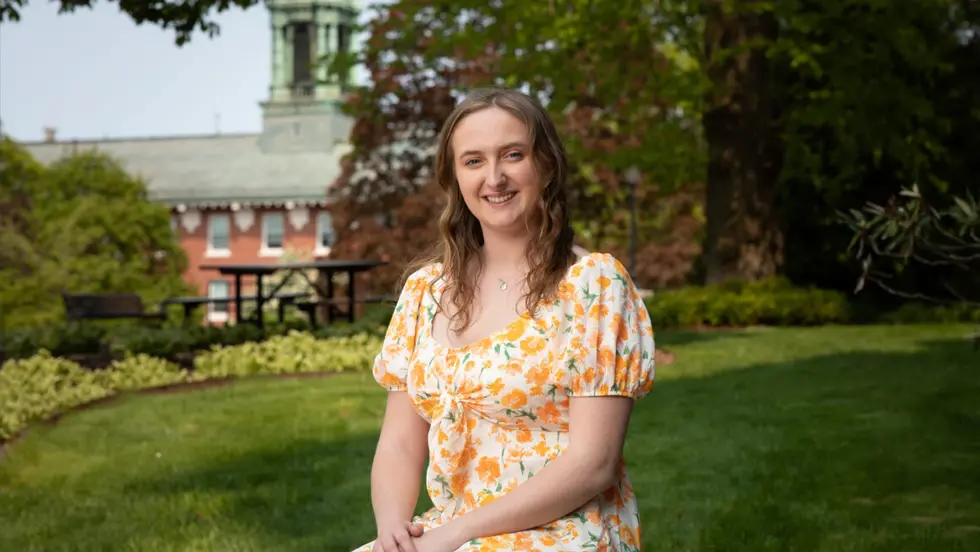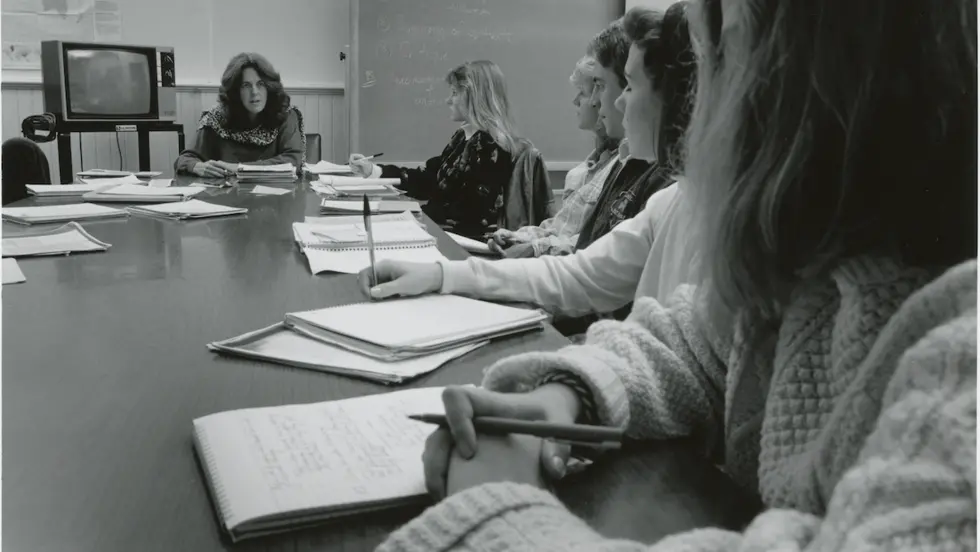
Gender, Sexuality, and Women’s Studies
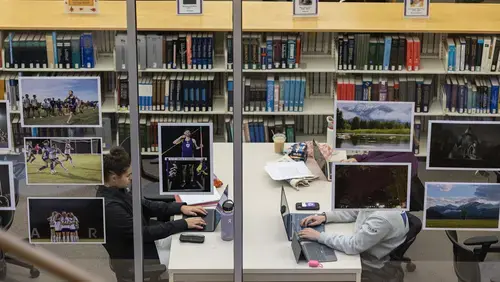
Areas of Study
Offered through the Center for Interdisciplinary Studies, the Gender, Sexuality, and Women’s Studies program challenges students to:
- Consider how complex social identities such as race, social class, age and ability intersect with gender and sexuality to shape the world
- Examine and challenge taken-for-granted assumptions
- Explore and honor marginalized experiences and perspectives
- Question power at personal, interpersonal, social, structural levels
Requirements
Concentration (6 courses)
These six courses must be taken across three or more academic disciplines, with no more than two courses from the student’s major department. No more than one approved internship may be applied toward the concentration. All courses applied to the concentration must be taken for a letter grade.
Required Courses for Concentration
GSWS 120: Introduction to Gender, Sexuality, and Women’s Studies, or an equivalent course approved by the GSWS Director
One of these course courses should have a cross-cultural dimension.
One 300- or 400-level seminar or a capstone experience, subject to the approval of the GSWS Director. The capstone is an independent project that can take the form of a research paper, an art or performance piece, or an action campaign. The capstone must be completed during the student’s senior year, in consultation with a faculty advisor, and in the context of a course, independent study, internship, or some other credit-bearing venue.
Major (11 courses)
The self-designed major allows you to customize your curriculum while meeting these common requirements.
Required Courses for Major
GSWS 120: Introduction to Gender, Sexuality, and Women’s Studies, or an equivalent course approved by the GSWS Director.
One course focused on LGBTQ+ topics. Examples include:
ANTH 255: Genders and Sexualities
ANTH 386: Global Queer Activism
CLAS 199: Intro to Greco-Roman Gender and Sexuality
LATN 399: Constructions of Gender and Sexuality
FREN 472: Race & Gender in French Cinema
HIST 401: Gender & Sexuality
MUSC 390: Music & Gay Rights
RELS 299: Theology & Sexuality
RELS 344: Sex, Money, Power and the Bible
SOCL 274: LGBTQ Studies
STWL 234: Women Make Film
THEA 145: Gay Theater and Film
One course exploring the transnational intersections of gender and/or sexuality with other systems of oppression, such as race, social class, religion, ethnicity, citizenship, age, and ability. Examples include:
ANTH 255: Genders and Sexualities
ANTH 269: Fashion and Consumption
ANTH 253: Gender and Development
ANTH 399: Global Queer Activism
CISS 399: HIV-AIDS in Global Perspective
CISS 255: Critical Issues in Global Health
FREN 472: Race & Gender in French Cinema
HIST 101: Family and Gender in China
HIST 101: Sex & Nationalism
HIST 290: Sex and Society in African History
POLS 399: Democratization & Women’s Rights
One course from each of the following three categories:
Aesthetic, artistic or literary representations. Many such courses are found in Academic Division B in the Departments of English, World Languages, Literatures, and Cultures, Music, Spanish, Theatre, and Visual Arts. Examples include:
ENGL 345: British Women Writers
ENGL 353: American Women Writers
ENGL 399: Toni Morrison
ENGL 399: Irish Women Writers
ENGL 399: Irish Literary Activism
ENGL 401: Jane Austen
ITAL 253: Italian Women's Autobiography
MUSC 295: African American Music
STWL 221: Writing Women in the 20th century
STWL 234: Women Make Film
THEA 136: Horror Films, Sex and Gender
THEA 145: Gay Theater and Film
VAHI 136: Narrative in Art and Film
Structural inequality, power and privilege. Many such courses are found in Academic Division C in the Departments of Economics and Accounting, Education, Political Science, Psychology, and Sociology and Anthropology. Examples include:
ANTH 255: Genders and Sexualities
ANTH 269: Fashion and Consumption
ANTH 253: Gender and Development
ANTH 399: Global Queer Activism
ECON 299: Gender & Economics
POLS 399: Democratization & Women’s Rights
PSYC 228: Psychology of Adolescence
PSYC 244: Health Psychology
PSYC 342: Gender Role Development
PSYC 354: Psychology of Stigma
SOCL 259: Children and Violence
SOCL 254: Girls and Violence
SOCL 277: Gender and Society
SOCL 299: Sociology of Emotion
SOCL 376: Women and Non-violence
Historical perspective. Many such courses are found in Academic Division D in the Departments of Classics, History, Religious Studies and Philosophy. Examples include:
CLAS 221: Women in Classical Mythology
CLAS 175: Ancient Manhood Contested
HIST 101: Family and Gender in China
HIST 101: Sex & Nationalism
HIST 290: Sex and Society in African History
HIST 401: Gender & Sexuality
RELS 118: New Testament
RELS 199: Gender and Sexuality in the Bible
RELS 221: Women in Early Christianity
RELS 284: Sex, Money, Power and the Bible
RELS 323: Ancient Households
Four courses that deepen the student's understanding of a single theme and/or region of the world that they choose in consultation with their advisor; two of these courses must be at least at the 200 level, and one must be at the 300 level or above.
Themes might include topics such as: sexuality, intersecting identities, gender and aesthetics, gender and health, challenging normativity, gender violence in political contexts, narrative representations of gender or sexuality, or global feminisms/masculinities.
An independent project that can take the form of a research paper, an art or performance piece, or an action campaign. The capstone must be completed during the student’s senior year, in consultation with a faculty advisor, and in the context of a course, independent study, internship, or some other credit-bearing context.
Meet Your Program Director

Opportunities
Research
Advanced research opportunities are available to students with their capstone experience, where they work closely with a faculty member and present their research at the end of the year at the Holy Cross Academic Conference. The capstone experience may be a culminating research paper, artistic project, or performance. View examples of recent papers on CrossWorks.
Community-Based Learning
Students frequently take part in academic internships and community-based learning related to gender, sexuality, and women’s studies. Sites have included Abby’s House, the Nativity School of Worcester, Central Massachusetts Housing Alliance, YWCA/Daybreak, Community Harvest Project, and Worcester Common Ground. For more information, visit the Academic Internship Program and Donelan Office of Community-Based Learning sites.
Study Abroad and Away
Students have the opportunity to extend their learning about issues in gender, sexuality and women's studies by attending any one of a number of excellent study abroad programs, or by participating in the Washington Semester Program. Over the past few years, concentrators have had internship placements at a number of interesting sites, including the Human Rights Campaign, Girls Inc., National Organization for Women, and Congressional Offices: House and Senate offices.
Student Organizations
Students interested in gender, sexuality, and women’s studies are frequently involved in community and campus activism groups, including, PRIDE (LGBTQIA & Allies), which educates the College campus on the issues faced by Lesbian, Gay, Bisexual, Transgender, Queer, and other non-straight non-cisgender (LGBTQIA+) people, as well as uplifting the voices of LGBTQIA+ people through active and passive programming, and ProspHER, which generates community and solidarity for self-identified women of marginalized identities, while supporting career growth and wellness for general members.
Gender, Sexuality, and Women’s Studies Award
The annual award is given to a senior concentrator on a competitive basis for academic excellence in the Gender, Sexuality and Women’s Studies Program, development and articulation of a feminist critical consciousness, and engagement demonstrating the link of theory and practice.



